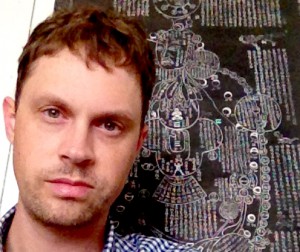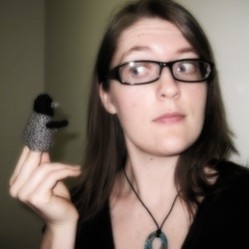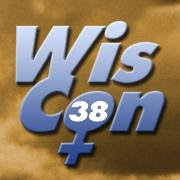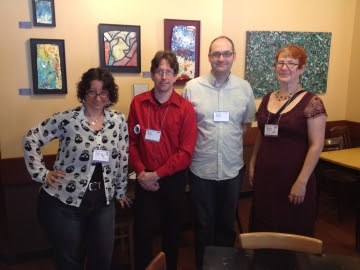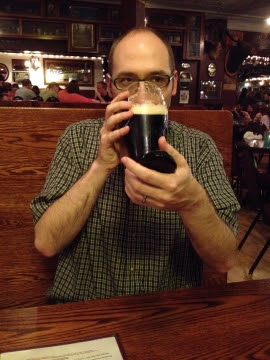Gray fog condensed on the slate roofs of City College and the surrounding town, dripping onto oblivious students and Salvatore Vega. Sal hunched against the damp. Drops slid down his ponytail and under the collar of his second-hand leather jacket. A gust of wind from a passing aircar banged Sal’s guitar case against his knee. Fine way to start a Saturday night of busking. His fingers itched to play. Sal ducked through a door.
The first location overflowed with wireheads. No audience to hear him with the wireds jacked in to their virtual realities, hair cut short to show off silver or gold disks gleaming with bling at the back of their necks. Desire clenched Sal’s gut for the ability to be online 24/7. His former wired audiences loved his digital concerts which had combined spontaneous mixes of music with improvised online looping and unlimited effects options. Instant access to a complete history of blues had allowed him to pull inspiration from Muddy Waters, Bonamassa or Paz-Moreno for melody lines and licks. Now he had to rely on old-fashioned methods of making music.
Someone laughed aloud in the otherwise quiet bar. Probably the old joke about real beer tasting better than virtual crap. The college kids spurned conversation in favor of virtual chat, which allowed them to drink without interruption. If he played, they’d complain that his live-only music interfered with their internal playlists. He sighed, rubbed the scarred skin hidden by his long hair, and moved on.
At the Holo-Moon Pub, the barman waved. “You got maybe an hour,” he said, skinny finger pointing to a corner. No stage, but a mic and an ancient Peavey amp sat ready. Sal tuned his vintage Martin and strummed a few chords to calm his gig nerves. He buried himself in his blues. When a large group of wireds arrived, Sal packed up and left, accepting the fifty the barman offered with a grateful nod.
Bouncers turned Sal away at the next few bars already jammed with wireheads. Each was eerie with silence unless a beer bottle was opened or glasses clinked under the draft taps. But Sensation Cafe’s owner had an unwired daughter who worked weekends; she smiled and handed Sal a free brew. “Take a spot under the outer awning.”
Wireheads passed by. Some paused near Sal, but their eyes twitched, the tell-tale indication of online activity. At best he provided background music while they completed their research papers or engaged in virtual chemistry labs. A few others, unwired like Sal, stopped to listen and tossed the odd bill into his open case. One older man dropped a folded twenty. Deep creases surrounded his eyes.
“Gracias,” Sal said between lyrics.
By midnight Sal counted his take and blew out a breath. He’d collected enough to pay the hostel for another week and then some. Enough to live on, with a little left for savings and another shot at being wired. The research hospital connected to the college was testing experimental anti-rejection drugs. While he qualified for the drugs, he still had to foot the bill for the wiring itself.
As he packed his guitar a woman walked up to him. Green eyes sparkled at Sal. She had cropped pink hair. No one with short hair ever displayed interest in Sal.
“You sound so good, Satan himself must have tuned your guitar.” Her tone, full and rich, sounded like that of a trained singer.
He unclipped an old LED tuner from his headstock. “I wish,” he said. If El Diablo showed up and offered surgery for his soul, he might take the deal.
“Want to get paid to play for an appreciative audience?”
“Sí, definitely.” He was down to his last spare B-string. The cost of new titanium alloy strings would be easier to bear with income from a bonus performance. The blues might ease his loss, but real-world needs called for cash. “I’m Sal.”
“Melusine.”
Sal followed her past his usual haunts and down damp side streets. She stopped in front of a building Sal hadn’t noticed before, a Victorian with delicate scrollwork, bay windows, and turrets. The windows were blacked out and no sign hung by the door. If this was a bar it must do lousy business. So much for new strings.
The oak door swung inward. A stocky woman with curly blond hair piled on top of her head stepped out and hugged Melusine.
“You found him?”
Melusine grinned. “Sal, meet Stella Johnson, owner of Unplugged.”
Stella looked him over. “Turn around.”
Stella probed the scar under his ponytail. He flinched.
“You’ll want to cut your hair or change the style. No one on staff hides their neck.”
“Wait,” Sal said, “I’m not your employee. Melusine offered me a paying gig.” He raised his guitar case.
Stella said, “Don’t freak. The gig’s yours. If it goes well, we’re hiring.” She pushed the door wide and beckoned Sal and Melusine inside.
Hiring?
The well-lit interior of Unplugged bore little resemblance to a bar. The mahogany floor was too clean. A fresh citrus scent permeated the air. Canned music played in the background. A variety of people, unwired and wired, sat at cozy tables talking and laughing. In the back rose a grand double staircase. Cubicles with hands-on net access equipment filled the left third of the room.
A teenage girl, neon-green bob bouncing, brought water to Sal and the others.
“What is this place?” Sal clutched the bottle, uneasy.
“Unplugged is a counseling center for unwireds,” Stella said.
“Many retreat from life,” Melusine said. “Therapy is the first step toward recovery. Look.”
A white-coated counselor escorted a young woman down the stairs. The woman clutched a braid to her chest. Sal watched her tuck newly-cut hair behind an ear. Tears stained her cheeks, but her eyes were filled with steel determination. She wiped her face and joined a table where everyone offered a smile or a hug.
Sal frowned, confused. This place, so bright and positive, was nothing like the clinic in Mexico. The doctors and psychologists there couldn’t help him. He used the blues to deal with his emotions and did his best to get along without breaking down. Sal gulped down his water. He should leave.
Before he could get out, Stella pointed to her own neck and asked, “How long since you lost your connection with the common mind of humanity?”
The last thing Sal wanted to do was talk about it. His connection had functioned for seventeen months before the anti-rejection drugs failed. “Five years,” he said, compelled to honesty by Stella’s loss, his words clipped, rude.
“I sense your pain, your frustration. But you aren’t alone.” Stella stared at the people around her. “We all struggle, marginalized, in a society that lives online.”
“Balance,” Melusine said, “is what we need. Between 24/7 access to the net, and interaction with the real world. Stella helped me and can help you too.”
“You’re wired,” said Sal. “Wired life is real, necessary to get along.”
“Sure,” she said, tapping the gold at the back of her neck. “But once I had it, I never disconnected.” She bit her lip and blushed. “I ignored people unless we interacted online, even if we were in the same room. After my boyfriend broke up with me, I almost got rid of my wiring.”
Voluntarily give up being wired? “That’s loco, chica. Not everyone has that problem.”
“Most of us wish wiring our brains had worked, or wish it hadn’t stopped working. But we still have online access.” Stella pointed to the cubicles, then to the phone in a client’s hand. “We have to concentrate on the positive. Your music can make a difference.”
“You don’t understand,” said Sal. “I don’t need grief counseling. I want to be wired.” He shoved his water bottle at Stella and headed for the door. He’d find a different job.
Melusine grabbed his hand and stopped him. Her touch, so warm, so soft, held Sal frozen in place. When she drew him to a platform with a stool, he didn’t resist.
“Play, Sal.”
He could rationalize his decision, tell himself he was only changing his mind because they’d offered to pay him. No one had even told him how much. But that wasn’t it. He wanted to play for her.
Sal set his case down. “What should I sing?”
Melusine patted his cheek. “Anything. Improvise. You’re the blues player.”
He sat in front of the clients and employees of Unplugged. With the warm wood of his Martin snug against his body, he played around a scale for inspiration. The A minor blues flowed from Sal to his audience, throbbing syncopation emphasizing gritty lyrics:
“My guitar sings the blues, of virtuality
Yeah she cries the blues of virtuality
You’ll miss her when she’s gone, lost reality.”
Chairs creaked as people shifted to face him. Conversations stopped. Sal opened up, allowing every minor chord to expose his failure, the anger and denial his audience shared over the lack of connection. Every person was riveted to his performance, their eyes clear and focused. So many people absorbed in his song. Like they wanted something. Nerves gave way to an endorphin rush.
Melusine walked behind him and skimmed her fingertips along his neck. Despite the instinct to pull away, conscious of his scar, a ripple of pleasure flowed across his skin. Sal’s fingers slipped. He played a dominant seventh, then shifted into his song’s relative major key. The brighter notes changed his melody, major chords evoking images of what the unwireds gained: the slow caress of a raindrop, the lush sweetness of a ripe strawberry, or the mesmerizing sound of a live guitar performance.
When Sal shifted to his minor blues progression, Melusine joined in, singing harmony.
“My love sings the blues, of virtuality,
But there’s more to life, than virtuality,
Hold me in your arms, flesh reality.”
The audience tapped their toes and rocked to the beat, in sync with Sal, Melusine, and each other. Sal absorbed their energy and gave it back, sweat beading his forehead, notes ringing out.
This was different from playing in the bars or on the street, earning the casual attention of those few who could hear him. Back when he could combine virtual tracks with a live performance in the privacy of his own studio, his attention was split between playing and programming. His rapport with those tuned in to his shows was digital, not visceral. But nothing came between Sal and this audience. The music created a bond intense as a deep kiss.
After the last note faded, the audience stood to clap, many with glistening eyes.
“You’re better now than you ever were online,” said Melusine.
“You remember my concerts?” Sal hadn’t known the identities behind the majority of avatars that applauded in cyberspace.
Her soft laugh answered. “How do you think I chose you for Unplugged? When you were wired, you borrowed the form of the music. Now, the blues are in your blood, deep, personal. Share your pain. Help us. Help yourself.”
“I don’t know if this changes anything,” he said. “About the surgery.”
“I know,” she whispered, her lips brushing his ear. “But you’re already changing things.”
Sal shivered at her touch, at the applause. On the edge of the crowd, Stella gave him a thumbs up. The steady gig was his; all he had to do was make a choice. His ponytail lay heavy against his scar. Sal plucked opening notes and everyone quieted, intent on him. Ironic, that playing here could pay his way out of needing the services they’d insist on offering him.
The tear-stained woman leaned forward, smiling, braid no longer clutched in her hand. She needed proof that unwired life wasn’t just worth living, but offered moments like this, real with sorrow and bliss. Sal nodded to her, to Melusine, and to Stella. The intense sensation of this performance outshone anything in his past. He wanted this.
Sal played on.
© 2015 by Lee Budar-Danoff
Author’s Note: At the current rate of technological progress, it isn’t hard to believe one day we’ll be able to directly access the Internet through wireless brain-computer interfaces (BCI). Yet, as with organ transplants, there is no guarantee that every person who wants a BCI will be able to use one without side effects, or even experience rejection. How will people react and cope with rejection, isolated as a have-not among the haves? As a guitar player, I already use online resources for my music. What would happen to a musician who experiences and then loses the ability to create the music he hears in his head?
 Lee Budar-Danoff sails, plays guitar, and writes when she isn’t reading. Lee volunteers as Municipal Liaison for National Novel Writing Month and is an alum of the Viable Paradise Writer’s Workshop. A former history teacher, Lee spends that energy raising three children with her husband in Maryland.
Lee Budar-Danoff sails, plays guitar, and writes when she isn’t reading. Lee volunteers as Municipal Liaison for National Novel Writing Month and is an alum of the Viable Paradise Writer’s Workshop. A former history teacher, Lee spends that energy raising three children with her husband in Maryland.
If you enjoyed the story you might also want to read DP Fiction #1: “Taste the Whip” by Andy Dudak or to visit our Support Page.

